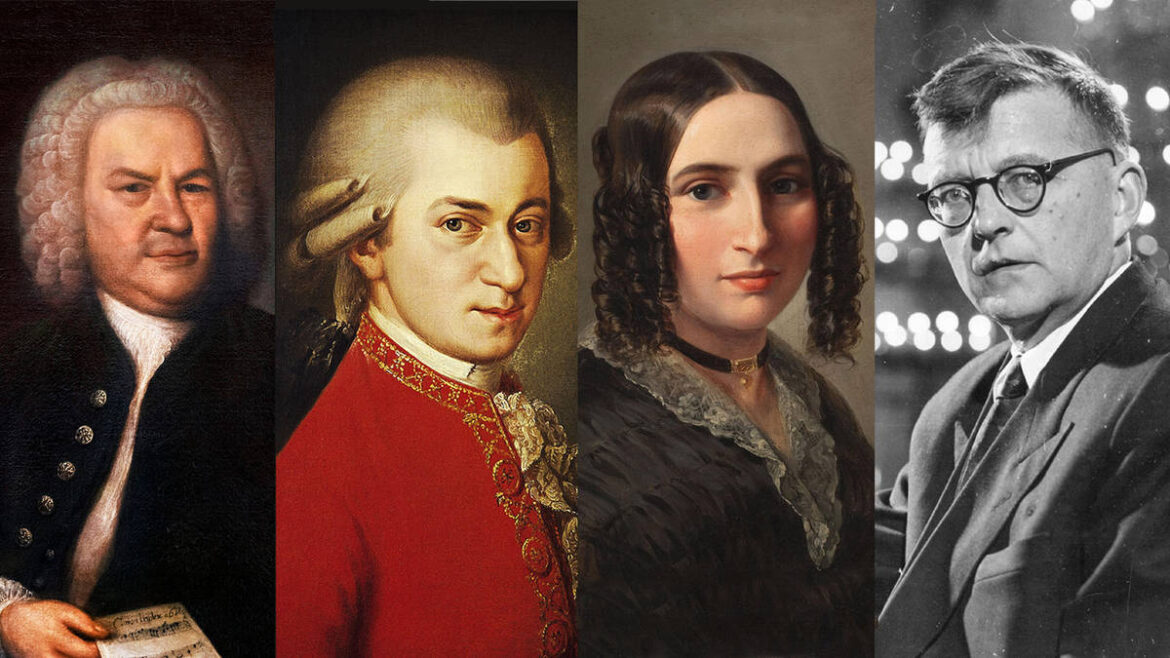326
Medieval Period (c. 500–1400)
- Boethius (c. 480–524) – Roman philosopher and early theorist of music.
- Isidore of Seville (c. 560–636) – Documented early music theory.
- Hildegard von Bingen (1098–1179) – Composer, mystic, and abbess; wrote monophonic sacred songs.
- Leonin (fl. 1150s–1201) – Developed early polyphony at Notre-Dame Cathedral.
- Perotin (c. 1200) – Expanded polyphony (organum); successor to Leonin.
- Guillaume de Machaut (c. 1300–1377) – First to write a complete Mass cycle (Messe de Nostre Dame).
Renaissance Period (c. 1400–1600)
- John Dunstaple (c. 1390–1453) – English composer; influential in the Burgundian school.
- Guillaume Dufay (c. 1397–1474) – Key figure in early Renaissance polyphony.
- Johannes Ockeghem (c. 1410–1497) – Master of complex counterpoint.
- Josquin des Prez (c. 1450–1521) – One of the most famous Renaissance composers.
- Giovanni Pierluigi da Palestrina (c. 1525–1594) – Model of Catholic church music.
- Orlando di Lasso (1532–1594) – Prolific composer in many languages and forms.
- Thomas Tallis (c. 1505–1585) – English choral composer.
- William Byrd (1543–1623) – English composer bridging Renaissance and early Baroque.
Baroque Period (c. 1600–1750)
- Claudio Monteverdi (1567–1643) – Early opera pioneer (L’Orfeo).
- Heinrich Schütz (1585–1672) – Early German Baroque master.
- Jean-Baptiste Lully (1632–1687) – French opera and ballet composer.
- Henry Purcell (1659–1695) – Leading English Baroque composer (Dido and Aeneas).
- Arcangelo Corelli (1653–1713) – Important in developing violin music.
- Antonio Vivaldi (1678–1741) – Prolific Italian composer (The Four Seasons).
- Georg Philipp Telemann (1681–1767) – Extremely prolific German composer.
- George Frideric Handel (1685–1759) – Composer of Messiah and many oratorios.
- Johann Sebastian Bach (1685–1750) – German master of counterpoint and sacred music.
Classical Period (c. 1750–1820)
- Carl Philipp Emanuel Bach (1714–1788) – Transitional figure between Baroque and Classical.
- Christoph Willibald Gluck (1714–1787) – Opera reformer.
- Franz Joseph Haydn (1732–1809) – “Father of the Symphony” and string quartet.
- Wolfgang Amadeus Mozart (1756–1791) – Prodigy and master of symphony, opera, and chamber music.
- Ludwig van Beethoven (1770–1827) – Transitional figure to Romanticism; wrote 9 symphonies.
Romantic Period (c. 1820–1900)
- Franz Schubert (1797–1828) – Composer of lieder (art songs) and symphonies.
- Hector Berlioz (1803–1869) – Innovator in orchestration (Symphonie fantastique).
- Felix Mendelssohn (1809–1847) – Composer and conductor; revived interest in Bach.
- Frédéric Chopin (1810–1849) – Polish composer of piano works.
- Robert Schumann (1810–1856) – Composer and music critic.
- Franz Liszt (1811–1886) – Virtuoso pianist and symphonic poet.
- Richard Wagner (1813–1883) – Revolutionized opera (The Ring Cycle).
- Giuseppe Verdi (1813–1901) – Italian opera master (La Traviata, Aida).
- Johannes Brahms (1833–1897) – Symphonist and Romantic traditionalist.
- Pyotr Ilyich Tchaikovsky (1840–1893) – Russian composer of ballets and symphonies.
- Anton Bruckner (1824–1896) – Composer of large-scale symphonies.
- Antonín Dvořák (1841–1904) – Czech composer (New World Symphony).
- Gustav Mahler (1860–1911) – Composer of massive symphonies with existential themes.
20th Century to Contemporary (c. 1900–Present)
- Claude Debussy (1862–1918) – Impressionist composer (Clair de Lune).
- Maurice Ravel (1875–1937) – French composer (Boléro); refined orchestration.
- Sergei Rachmaninoff (1873–1943) – Romantic Russian composer and pianist.
- Igor Stravinsky (1882–1971) – Avant-garde composer (The Rite of Spring).
- Arnold Schoenberg (1874–1951) – Pioneer of atonality and twelve-tone technique.
- Béla Bartók (1881–1945) – Integrated folk music into classical forms.
- Dmitri Shostakovich (1906–1975) – Soviet composer of symphonies and quartets.
- Benjamin Britten (1913–1976) – English composer (War Requiem).
- Leonard Bernstein (1918–1990) – American conductor/composer (West Side Story).
- John Cage (1912–1992) – Experimental music pioneer (4’33”).
- Philip Glass (b. 1937) – Minimalist composer.
- John Adams (b. 1947) – Contemporary American composer (Nixon in China).
✅ Summary of Key Periods
| Period | Approx. Dates | Key Traits | Key Composers |
|---|---|---|---|
| Medieval | 500–1400 | Chant, early notation | Hildegard, Machaut |
| Renaissance | 1400–1600 | Polyphony, sacred/secular balance | Josquin, Palestrina, Byrd |
| Baroque | 1600–1750 | Ornamentation, basso continuo | Bach, Handel, Vivaldi |
| Classical | 1750–1820 | Clarity, structure (sonata form) | Mozart, Haydn, Beethoven |
| Romantic | 1820–1900 | Emotion, nationalism, individualism | Chopin, Brahms, Wagner, Tchaikovsky |
| 20th Century+ | 1900–present | Innovation, dissonance, minimalism |

